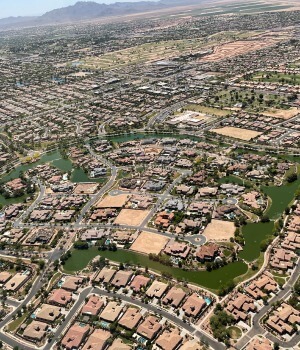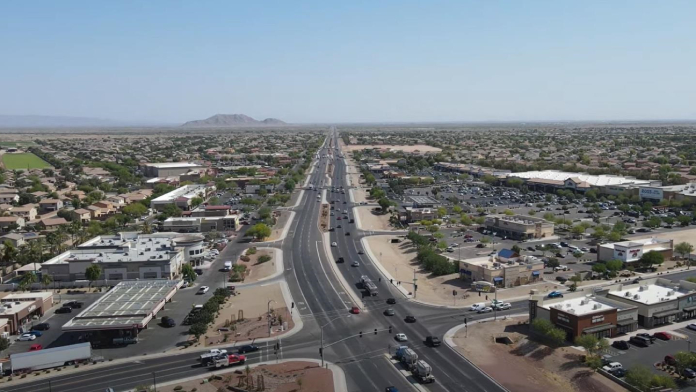Alcohol and Drug Use Statistics in Maricopa, AZ
Like the rest of the U.S., Maricopa, AZ is experiencing a drug and alcohol misuse crisis with many residents experiencing substance abuse. A national survey between 2016 and 2018 on drug use and health revealed the following statistics for residents 12 years and older in Pinal county and the corresponding substate region in Arizona:2
About 1% reported methamphetamine use in the past year.
About 4% reported pain reliever misuse in the past year.
Nearly 48% reported alcohol use in the past month.
About 25% reported binge alcohol use in the past year.
Levels of Substance Abuse Treatment
Substance abuse treatment often follows a continuum of care that flows from most to least restrictive. Some Arizona residents receive care at each level, while others may only need the least intensive treatment services.
Detox
Detox is often the initial step of rehab treatment. It occurs in a supervised medical setting and involves safely and comfortably clearing your system of all drugs and alcohol.
Residential or Inpatient
This is the most intensive treatment setting. Residential or inpatient treatment involves 24/7 supervised care. Participants usually receive individual and group therapy and may also receive medication and additional types of therapy.
Partial hospitalization programs (PHPs)
PHPs typically involve many of the same treatment services as inpatient care. However, you return home during non-treatment times.
Intensive Outpatient Programs (IOPs)
In an IOP, you participate in several hours of treatment over several days per week. Methods often include individual and group therapy. Many Arizona residents transition to IOPs after completing a residential or PHP program.
Standard Outpatient
Standard outpatient treatment involves a couple of hours of care per week, usually at an outpatient clinic or in a therapist’s office. This treatment level is appropriate for individuals who have mild addictions and strong support systems.
Aftercare
Aftercare provides ongoing support once inpatient or outpatient treatment is completed. This care may include 12-step meetings, transitional housing, or therapy. It is a key component of relapse prevention.
How to Pay for Drug Rehab in Arizona
Private Insurance
By law, all insurance companies must provide coverage for substance abuse and mental health treatment, per the Mental Health Parity and Addiction Equity Act. However, each plan differs regarding specific benefits, so Arizona residents must contact their provider to learn about exact coverage.
Arizona Medicaid
Arizona Medicaid, known as the Arizona Health Care Cost Containment System (AHCCCS), provides coverage for drug and alcohol rehab services under the Mental Health Parity Act. Arizona residents may qualify for this program if they are a low-income adult, a child, a pregnant woman, an elderly adult, or a person with certain disabilities.
Medicare
Medicare is a federal health insurance program that provides coverage for Arizonans aged 65 and older, along with individuals diagnosed with certain disabilities. Addiction treatment services are covered under both Medicare Part A and Part B. However, not all rehab facilities accept Medicare, so it’s important to confirm accepted methods of payment before enrolling in a program.
Sliding Scale Rehabs
Sliding scale rehab programs allow Arizona residents to pay only what they can reasonably afford based on their income. Participants must typically provide proof of income to qualify.
TRICARE in Arizona
TRICARE in Arizona (West region) provides health insurance coverage for U.S. military personnel, veterans, and their dependents. Coverage includes addiction treatment services. However, plans differ in their specific coverage.
IHS-Funded Drug Rehabs
The Indian Health Service (IHS) is a federally funded program for indigenous people. Native Americans and Native Alaskans who need SUD treatment can receive low-cost or free services under this program.
Traveling to and Within Maricopa, AZ

Travel, accommodation, and recreation information may be useful if you are considering drug or alcohol rehab in Maricopa, AZ, or planning to visit a loved one receiving treatment there. The following tips may guide you when planning your stay in Maricopa:
- Maricopa is about 35 miles south of Phoenix and 40 minutes by car.
- The Amtrak station on West Mercado Street serves Maricopa and the greater Phoenix metropolitan area.
- Nearby airports for flight options to and from Maricopa include Phoenix Airport, 26.4 miles away, Phoenix-Mesa Gateway, 28 miles away, and Tucson Airport, 92 miles away.
- City of Maricopa Express Transit (MET) provides fixed route and on-demand bus service.
- Convenient travel choices within Maricopa include taxi and rideshare options like Lyft and Uber.
- Maricopa is not a walkable city, and you need a car for almost all your errands.
- Hotel options in Maricopa and the surrounding area include pricey hotels like the Sheraton Grande at Wild Horse Pass, Francisco Grande Hotel and Gold Resort, and Marriott Phoenix Chandler, as well as affordable selections such as the Quality Inn Chandler, Super 8 by Wyndham, and Harrah’s Ak-Chin Casino Resort.
- Places to explore in Maricopa include the Copper Sky Recreation Complex, Wild horse Pass Casino, Ak-Chin-Him-Dak Eco-Museum, Dwarf Car Museum, Koli Equestrian Center, and Huhugam Heritage Center.
Arizona Drug and Alcohol Laws
Arizona laws include the following policies regarding substance use and treatment.1,2,3,4
Public Alcohol Consumption: In Arizona, it is illegal to drink alcohol in certain public places. The law states it is unlawful “for a person to consume spirituous liquor in a public place, thoroughfare, or gathering.” The law doesn’t apply to private property or public recreation. Unlike other states, there are no “public intoxication” charges in Arizona. The act of consuming alcohol is unlawful, not the act of being drunk in public.
Naloxone Standing Order: This law allows any licensed pharmacist in Arizona to dispense naloxone without a prescription, and for any Arizonan to obtain naloxone from any pharmacy in the state.
Good Samaritan Law: Under this policy, Arizonans are protected from criminal liability if they seek medical assistance for a suspected overdose. The law is meant to save lives by removing fear of legal repercussions for possession or use of a controlled substance/drug paraphernalia and for providing alcohol to minors.
Court-Ordered Treatment: In Arizona, offenders who plead guilty to a drug offense may complete court-ordered treatment instead of serving jail time.
Health Insurance Waiver: Arizonans can pay for drug and alcohol treatment out of pocket, without penalty for not having health insurance. This is per Article 27, section 2 of Arizona insurance law, which states that a person does not need to participate in a healthcare system but may pay for healthcare services directly.
Resources
- Arizona Department of Health. (n.d.). Opioid Overdoses Surveillance Report, Arizona, 2020-2021.
- Substance Abuse and Mental Health Services Administration. (n.d.). 2016 -2018 NSDUH Substate Region Estimates – Tables.



